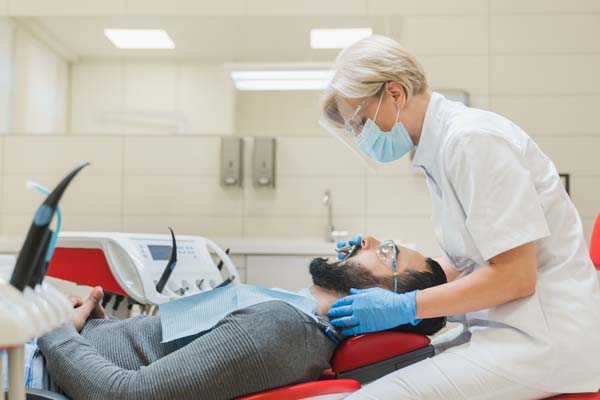Root canal treatment enables dentists to save infected, damaged, or decayed teeth. The procedure has a reputation as being painful, but this is far from the truth. Root canals were probably painful before the invention of local anesthetics, but now that is no longer the case. Local anesthetics are used during a root canal treatment, so patients do not feel significant pain as the dentist works on their tooth.
The root canal treatment process
Root canal therapy is usually suggested when a tooth’s pulp chamber has been damaged. The pulp chamber houses soft tissues like blood vessels and nerves, and it is sealed off from the rest of the tooth. Injury to a tooth can open this area, leaving these soft tissues susceptible to the bacteria and acids in the mouth. The risk of infection also goes up dramatically when a tooth’s pulp chamber is damaged.
Restoring a tooth with root canal therapy starts with the dentist evaluating the patient to see if it is the correct course of action. A visual examination is often performed, and diagnostics like X-rays might be used to assess what is going on inside a tooth.
Once it has been determined that root canal therapy is the appropriate treatment for the patient, the dentist will start the procedure by injecting the patient with a local anesthetic. This numbs the area being worked on so the patient does not feel pain as the dentist works. They will only feel the force of the dentist pushing and drilling into the tooth.
A dental drill is used to make a hole into the pulp chamber so the dentist can extract the soft tissue there with dental files. Medication might be inserted into the pulp chamber once the area has been thoroughly cleaned.
Depending on the severity of the infection in the tooth, the dentist might opt to reseal the tooth immediately or cover it with a temporary filling so they can insert another round of medication into the tooth in a week.
If the dentist thinks that one round of medication is enough for the tooth, a rubbery material called gutta-percha is used to close the tooth. The tooth can then be rebuilt using composite bonding, or a crown might be placed on it to complete the process.
Recovering after getting a root canal
There is no recovery period after having a root canal. The pain that brought the patient to the clinic is typically gone by the time the procedure is over. After getting a root canal, some patients might experience minor discomfort for the first few days. Over-the-counter medication can be used to address it. Patients are free to return to their regular routine after root canal therapy. Teeth repaired with root canal therapy will not be as strong as they once were, which is why dentists often recommend covering them with crowns to protect them against bite forces.
Save your damaged tooth
Root canal therapy can save your severely damaged or infected tooth. Call or stop by our Spokane clinic to set up an appointment with our dentist.
Request an appointment here: https://brookemcloningerdds.com or call Brooke M. Cloninger, D.D.S. at (509) 319-2152 for an appointment in our Spokane office.
Check out what others are saying about our dental services on Yelp: Root Canal Treatment in Spokane, WA.
Related Posts
The Root Canal: Is It the Best Option or Is There Another Way?
Root canal. Medieval torture. Both phrases make even the bravest of us a little queasy, but root canals are actually legal. Our natural response to, "You need a root canal," is, "Do …
A Step-by-step Guide to Having a Root Canal
A root canal is a restorative procedure that can save a tooth from severe infection. If you are experiencing extreme pain in your mouth, you may need this treatment. This is no …
How to Prepare for a Root Canal Treatment
Getting a root canal may seem to be a daunting task to most, as there are numerous rumors about root canals being a painful procedure. However, contrary to popular belief, when done right, a root …
What Is a Preventative Dentist?
A preventative dentist focuses on maintaining a patient’s oral health and preventing problems, such as sensitive teeth, from becoming more serious issues, like gum disease. This typically involves routine dental checkups, cleanings, …

